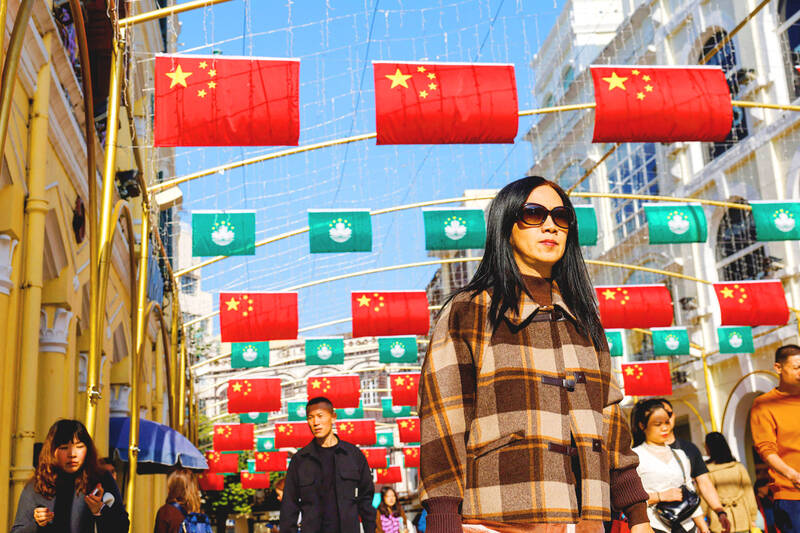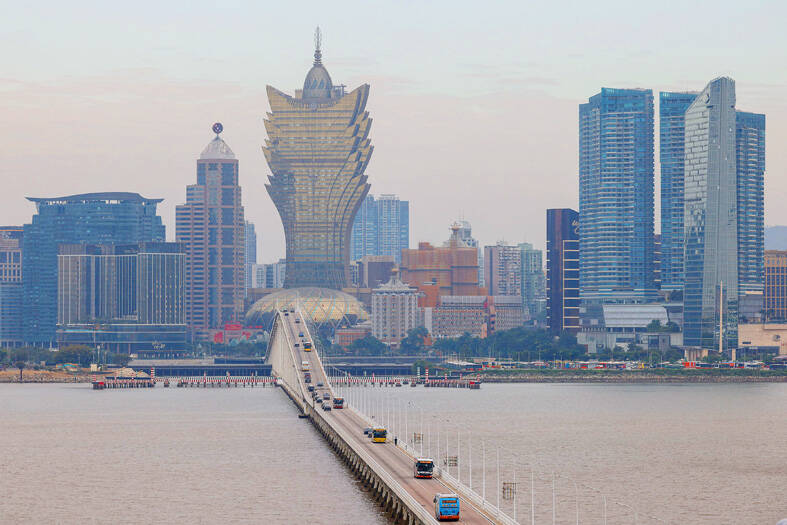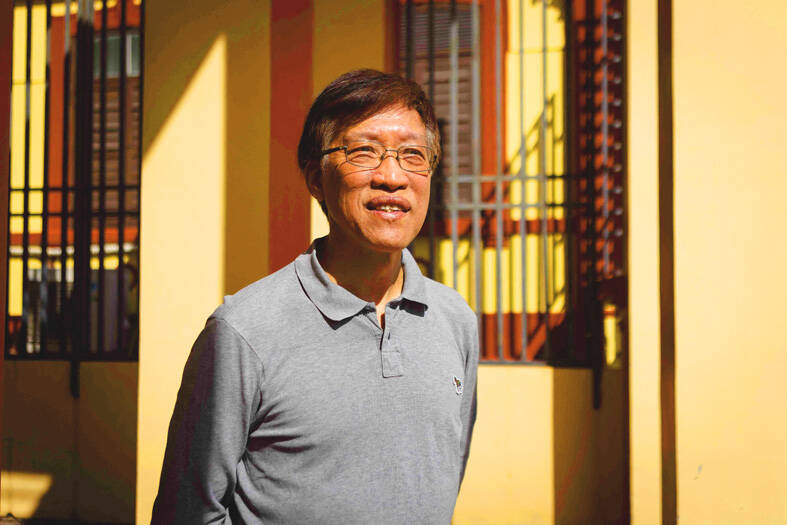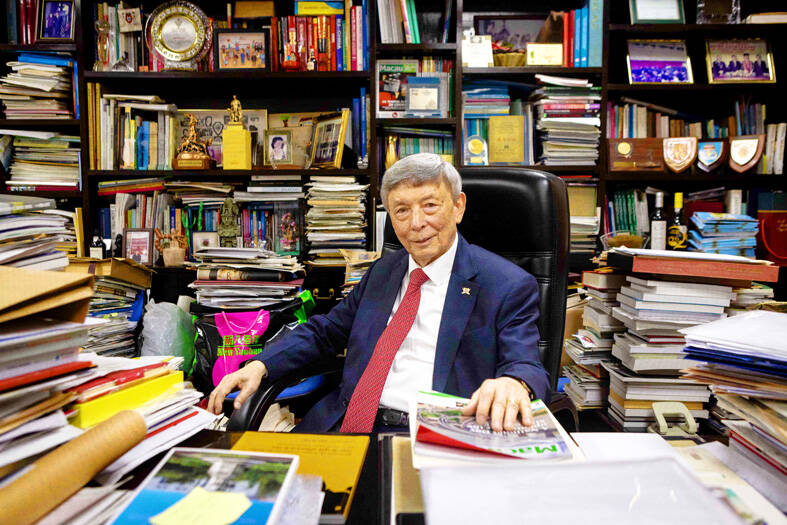A decade ago, the elegant cobblestone streets of Macau’s Tap Seac Square were jam-packed with people clamouring for change and government accountability — the high-water mark for the former Portuguese colony’s political awakening.
Now as Macau prepares to mark the 25th anniversary of its handover to China tomorrow, the territory’s democracy movement is all but over and the protests of 2014 no more than a memory.
“Macau’s civil society is relatively docile and obedient, that’s the truth,” said Au Kam-san (歐錦新), 67, a schoolteacher who became one of Macau’s longest-serving pro-democracy legislators.

Photo: Reuters
“But if that were totally true, we wouldn’t have our diversity of voices. Our young people have their own views,” he said.
Au entered politics after the 1989 Tiananmen Square crackdown, for years campaigning on issues such as livelihood, corruption and electoral reform.
On that day in May 2014, he helped organize a 20,000-strong rally to oppose a policy granting perks to retired officials, leading to a rare government concession.

Photo: Reuters
Today, public protests in Macau are just a memory after Beijing launched sweeping measures in the past five years that ousted opposition lawmakers and chilled free speech.
Ahead of the anniversary, multiple Macau democrats said they were warned not to make critical remarks in public.
“There is a strong sense of suppression, and the whole civil society has fallen silent,” Au said.

Photo: AFP
Macau reverted to Chinese rule in 1999 via a “one country, two systems” framework that promises a high degree of autonomy, separate legal system and stronger safeguards for civil liberties than those on the mainland.
However, unlike neighboring Hong Kong, Macau was never offered a guarantee of wider democratization in the Basic Law, its mini constitution.
Jorge Rangel (黎祖智), a minister in Macau’s final colonial administration, said democracy was not a priority when he and Chinese counterparts drafted the constitution.

Photo: AFP
“But I believe that at least the Macau members and some of the mainland members of the Basic Law [drafting committee] believed that it would be useful for Macau to have very active participation of the people,” Rangel, 81, said.
“My vision of one country, two systems is that we have a ... strong, active, independent civil society,” he said.
Macau’s 690,000 residents today have no say over the territory’s leader, who is selected by a committee of 400 pro-establishment figures.
Less than half of the legislators are elected by popular vote, and the pro-democracy camp has never won more than 15 percent of seats.
Unable to change the system from within, activists in the 2010s — including fresh faces like Jason Chao (周庭希) and Scott Chiang (鄭明軒) — explored ways to engage the public, such as keeping up the tradition of annual Tiananmen events.
Chao, 38, said activists also tried to spread progressive values, like trying to get “conservative” Macau to talk about LGBTQ+ rights, an uphill battle that yielded no clear payoff.
In 2014, he organized an online referendum — over the strident objections of Beijing representatives in Macau — asking the public if they supported universal suffrage for the territory’s leader.
More than 95 percent of the 8,700 respondents said “yes.”
“I felt [the results] were quite remarkable, and I’m grateful my team and I withstood the pressure to pull it off,” Chao said, adding the feat cannot be replicated now.
As recently as 2019, Chinese leaders praised Macau as a model of patriotism and stability — but as Hong Kong was rocked by huge and violent protests, Macau was not spared from the backlash.
In the 2021 legislature election, Chiang was among the pro-democracy candidates disqualified on grounds they failed to support the Basic Law or were “disloyal” to Macau.
“Some people at the time argued that we were moderates, different from the radicals in Hong Kong. Thinking back, this was of course entirely irrelevant,” Chiang, 43, said.
Chao and Chiang have emigrated and say they have no plans to return.
Democrats who remain see little cause for optimism.
Macau’s next leader, Sam Hou-fai (岑浩輝), was a top judge and one of his 2019 rulings massively restricted freedom of assembly, University of Macau academic Ieong Meng-u (楊鳴宇) said.
“On paper, Macau’s laws on assembly and protest are the most pro-free speech within the greater China region... [But] after the ruling came out, there have been no approved protests or rallies in Macau,” Ieong said.
Having decided not to run for re-election in 2021, ex-lawmaker Au had a frank assessment of his camp’s legacy.
“In terms of the political system we didn’t bring about any change.” Au said. “I admit that in the fight for democracy we have accomplished nothing.”
However, activists have changed civil society for the better, he said.
“Even though we are in a bitter winter, if there are changes to the external environment, these seeds in Macau may yet have a chance to sprout,” he added.

Packed crowds in India celebrating their cricket team’s victory ended in a deadly stampede on Wednesday, with 11 mainly young fans crushed to death, the local state’s chief minister said. Joyous cricket fans had come out to celebrate and welcome home their heroes, Royal Challengers Bengaluru, after they beat Punjab Kings in a roller-coaster Indian Premier League (IPL) cricket final on Tuesday night. However, the euphoria of the vast crowds in the southern tech city of Bengaluru ended in disaster, with Indian Prime Minister Narendra calling it “absolutely heartrending.” Karnataka Chief Minister Siddaramaiah said most of the deceased are young, with 11 dead

By 2027, Denmark would relocate its foreign convicts to a prison in Kosovo under a 200-million-euro (US$228.6 million) agreement that has raised concerns among non-governmental organizations (NGOs) and residents, but which could serve as a model for the rest of the EU. The agreement, reached in 2022 and ratified by Kosovar lawmakers last year, provides for the reception of up to 300 foreign prisoners sentenced in Denmark. They must not have been convicted of terrorism or war crimes, or have a mental condition or terminal disease. Once their sentence is completed in Kosovan, they would be deported to their home country. In

Brazil, the world’s largest Roman Catholic country, saw its Catholic population decline further in 2022, while evangelical Christians and those with no religion continued to rise, census data released on Friday by the Brazilian Institute of Geography and Statistics (IBGE) showed. The census indicated that Brazil had 100.2 million Roman Catholics in 2022, accounting for 56.7 percent of the population, down from 65.1 percent or 105.4 million recorded in the 2010 census. Meanwhile, the share of evangelical Christians rose to 26.9 percent last year, up from 21.6 percent in 2010, adding 12 million followers to reach 47.4 million — the highest figure

LOST CONTACT: The mission carried payloads from Japan, the US and Taiwan’s National Central University, including a deep space radiation probe, ispace said Japanese company ispace said its uncrewed moon lander likely crashed onto the moon’s surface during its lunar touchdown attempt yesterday, marking another failure two years after its unsuccessful inaugural mission. Tokyo-based ispace had hoped to join US firms Intuitive Machines and Firefly Aerospace as companies that have accomplished commercial landings amid a global race for the moon, which includes state-run missions from China and India. A successful mission would have made ispace the first company outside the US to achieve a moon landing. Resilience, ispace’s second lunar lander, could not decelerate fast enough as it approached the moon, and the company has